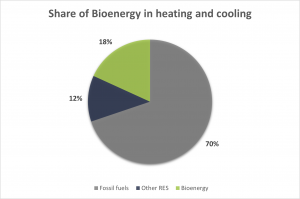Country Profile: Greece
Germany
Population: 83,166,711
Area: 357,022 km2
Country profile
Greece is a south-Eastern European country located in the south end of the Balkan peninsula, Greece has a very high level of human development and a GDP below the European average and a rather urban population.
The Greek climate is Mediterranean and warm. Almost a third of the country is covered by forest, with the other two thirds considered agricultural land, mainly covered by permanent pasture.
% of the H&C sector in the final energy consumption:33,1%
% of renewables in the H&C sector: 30,2%
% of bioheat within renewables in the H&C sector: 60,3%
Biomass for heating in Greece

Greece has a very similar renewable share as the EU average, around 20%. Almost half of the country power supply comes from lignite coal plants, which will be phased out by 2028.
In the heating & cooling sector, although bioenergy is the main source, the average renewability of the sector is fairly law (30%), however the country needs of heating is lower than other European countries thanks to its warm weather.
Overall heating stock in Greece has a similar age structure than the EU average. The Ministerial Decree 189533/2011 established requirements for central heating boilers used in the residential and service sector, as well as for hot water / steam plants in service sector buildings. New biomass boilers must comply with the requirements of Class 3 / EN303-5. Greek Domestic Energy Saving Plans finances up to 70% of funds gas, LPG and even oil boilers.
Greece only recently presented its Air Pollution Control Programme and the European Commission has not facilitated yet a translation.
Relevant documents
- Integrated National Energy and Climate Plan for Greece (EL– EN)
- National Air Pollution Control Programme (EL)
National initiatives
To see all initiatives carried by our partners in this country, go back to our map of initiatives and select the country for which you would like to get more information.

